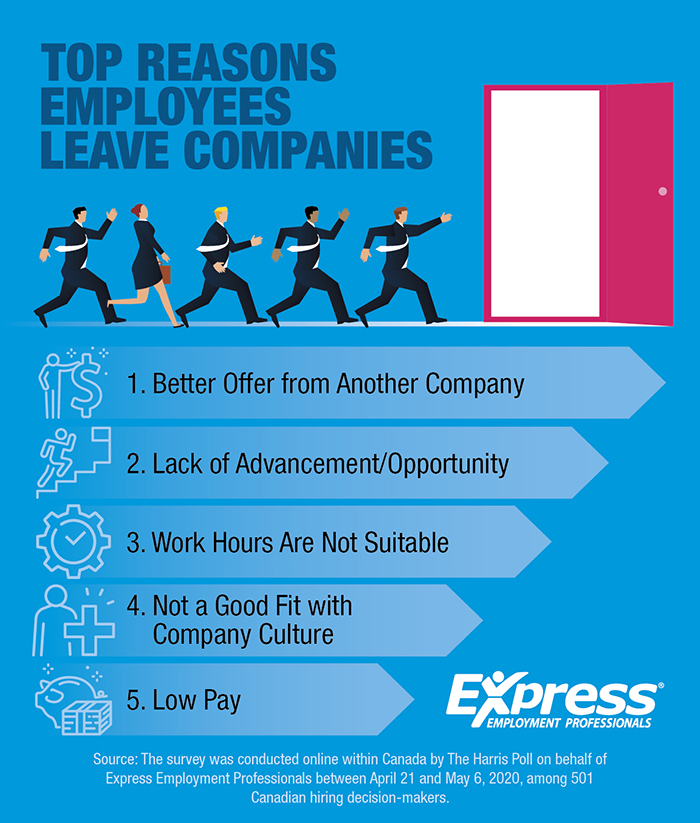Even in a Pandemic, Companies Still Struggle with Employee Turnover
TORONTO - August 12, 2020

A Better Offer Elsewhere is the Top Reason Employees Quit
Latest Data from The Harris Poll
In a time of record unemployment due to the COVID-19 pandemic, nearly 3 in 10 Canadian hiring decision-makers (27%) say one of the biggest pain points for employers when it comes to hiring is employee turnover.
This is according to a newly released survey conducted by The Harris Poll and commissioned by Express Employment Professionals.
Hiring decision-makers say employees cite better offerings at other companies as the top reason for quitting, such as pay/benefits (36%), perks (27%) or advancement opportunities (31%).
The primary reasons current employees leave jobs include:
- Had a better offer from another company - 32%
- Lack of advancement/opportunity - 21%
- Work hours are not suitable - 20%
- Not a good fit with company culture - 17%
- Low pay - 16%

Bruce Hein, Express franchise owner in Sarnia, Ontario, agrees that a better offer from another company is generally the most common reason employees leave their jobs.
"It's an all-encompassing reason because that better offer could include better hours, improved culture, opportunities for advancement, more money, generous benefits or all of the above," Hein said.
Express franchise owner Brent Pollington, based in Vancouver, British Columbia, also sees a better offer as the top reason to leave a job.
"I think certain companies feel it's a hiring market and try to hire people at a much lower rate," Pollington said. "This is solving a short-term problem, however the candidate continues to seek employment at the market rate they feel they are entitled to. This results in disengagement and dissatisfaction from both parties."
Of those whose company has had extended job vacancies, the vast majority (81%) say the extended vacancies had a negative impact on their company. This includes work not getting done (28%), less motivated employees (27%), lower employee morale due to employees being overworked (25%), loss in revenue (25%) or delays in delivery times (22%).
Hanif Hemani, managing director of an Express Employment office in Saskatoon, Saskatchewan, notes that some of the impacts of extended vacancies on companies include, "inadequate coverage of certain required functions, missing or incomplete tasks due to poor communication or anticipated contingency planning. This ultimately leads to internal employee dissatisfaction and external client dissatisfaction.
The extent to which these negative impacts are felt vary by company size, with the largest companies about two to three times as likely than the smallest companies to say they experience these frustrations.
When it comes to attracting workers, Pollington recommends that hiring decision-makers focus on what the typical applicant is looking for and what they gain from joining the company.
"Although the market has shifted slightly as a result of COVID-19, it is still very much a balanced market where companies and applicants have equal control and power in the market," Pollington said.
In terms of employee retention, Hein notes that it isn't an exact science because not everyone is looking for the same thing in a job; however it is still worth paying attention to.
"If employers wish to retain workers, the best thing they can do is try to keep them engaged, whether it's through ongoing training and development, setting clear expectations, flex time, bonuses, potential for advancement, etc.," Hein said.
Hein, Hemani and Pollington all agree that federal support programs such as the Canadian Emergency Response Benefit (CERB) have impacted the ability to attract workers, particularly at the entry-level position.
Hemani notes however that federal interventions have been both positive and negative.
"For existing employees, the federal programs such as the Canadian Emergency Wage Subsidy (CEWS) has helped employers keep their doors open and employees working in many cases. However, the CERB has made recruitment of new employees, especially for seasonal, temporary or lower wage roles much more difficult," he said.
Employees are a company's most valuable asset, and no matter market conditions, it's important to take care of them, says Express CEO Bill Stoller.
"There are a lot of variables in the current economic climate, but the one thing that will always propel businesses to success is a healthy company culture," he said. "Good employees are worth the investment."
Survey Methodology
The survey was conducted online within Canada by The Harris Poll on behalf of Express Employment Professionals between April 21 and May 6, 2020 among 501 Canadian hiring decision-makers (defined as adults ages 18+ in Canada who are employed full-time or self-employed or have been laid off, furloughed, or given a zero hour schedule in the past 60 days but worked full-time or were self-employed full-time prior, work at companies with more than 1 employee, and have full/significant involvement in hiring decisions at their company). Data were weighted where necessary by company size to bring them into line with their actual proportions in the population.
###
If you would like to arrange for an interview to discuss this topic, please contact Adria Minsky at
(416) 620-7111 or email
adria@mapleleafstrategies.com.
About Bill Stoller
William H. "Bill" Stoller is chairman and chief executive officer of Express Employment Professionals. Headquartered in Oklahoma City, the international staffing company has more than 825 franchises in the U.S., Canada and South Africa, and beginning in 2020 will expand to Australia and New Zealand. Since its inception, Express has put more than 8 million people to work worldwide.
About Express Employment Professionals
At Express Employment Professionals, we're in the business of people. From job seekers to client companies, Express helps people thrive and businesses grow. Headquartered in Oklahoma City, OK, our international network of franchises offer localized staffing solutions to the communities they serve, employing 552,000 people across North America in 2019. For more information, visit
www.ExpressPros.com.